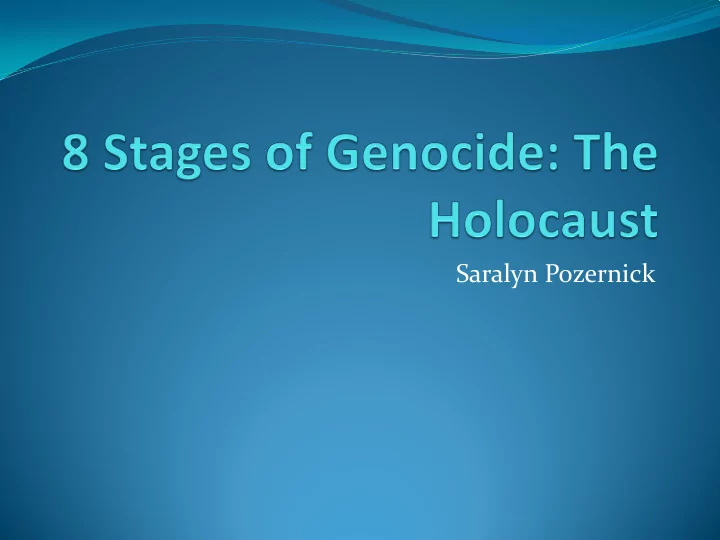

Saralyn Pozernick
History Anti-Semitism or hatred of Jewish people has a history of over 2000 years. “The earliest recorded religious attack or massacre of the Jews occurred in Alexandria, Egypt in the year 38. The Romans placed restrictions on the Jews because of their differences, and then isolated them within the city, eventually torturing and murdering them.” (The Holocaust Center).
History Continued The Crusades in Europe in the middle ages were an attempt to rid Europe of infidels or non-Christians. Early roots of Anti-Semitism in Europe After WWI, German politicians needed a scapegoat to blame economic problems on. They chose the German Jews.
Classification Germans (Aryans) vs. The minority groups (considered non-Germans)
Symbolization Swastika (Nazi) Star of David (Jews), pink triangle (homosexuals), etc.
Dehumanization Nazi government named Jews an “inferior race” Basic human rights were removed and Nuremberg laws were put into place. boycotting Jewish businesses, laws preventing Christians from marrying Jews, restricted the movement of Jews around the country, enforced curfews for Jews
Organization The Nazi’s, particularly the Schutzstaffel (SS), organized the genocide.
Polarization Propaganda blamed Jews for economic and social problems in the world preached that Jews must be excluded from society and schools. Used films, posters, and dramas to teach a distorted image of the Jews. Germans supporting Jews were threatened
Preparation Jews first sent to live in Ghettos. Minority groups were separated from Germans and sent to concentration camps.
Extermination Jews and minority groups were killed in various ways (eg: gas chambers, work camps, firing squads) This was very systematic
Denial Burned the bodies and placed them in mass graves. Citizens claimed they didn’t know anything & some denied involvement of the genocide at the Nuremberg trials. To this day the German government says the holocaust was carried out by only certain sections of the Nazi party.
International Response United States Most Americans were unaware of the Holocaust while it was going on. The United States government refused to grant temporary refuge to Jews fleeing Europe and limited the number of refugees each year to 10,000. This is mostly because of the Great Depression in the US.
International Response Great Britain 450,000 German Jews had fled to the British colony of Palestine by 1938 but Britain capped immigration to avoid angering Arab Palestinians. Switzerland The only neutral country to promulgate a German anti- Semitic law. Closed it’s French border to German Jews from 1942 to 1944. This protected Switzerland from Germany.
International Response Allied Forces stopped the Holocaust from continuing when they defeated the Nazis in World War 2 (1945) The United Nations adopted the genocide convention in 1948 A Universal Declaration of Human Rights was passed by the United Nations (1948) Nuremburg Trials held to punish the individuals responsible.
Call to Action Individuals Speak up when confronted with hate speech in your own community. Find out about the places that are at risk. Communicate with politicians (decision makers) about taking action to prevent genocide in other countries
“I swore never to be silent whenever and wherever human beings endure suffering and humiliation. We must always take sides.” — Elie Wiesel, Jewish-American writer, political activist, Nobel Laureate, and Holocaust survivor .
Call to Action Nations Heed early warnings from genocide watch groups. Take action against those committing genocide. Push for international courts for effective punishment. Develop the political will to care about this.
Bibliography “anti-semitism.” Merriam-Webster.com . Merriam-Webster, 2013. Web. 10 October 2013 "Why the Jews." The Holocaust Center . The Jewish Federations of North America, n.d. Web. 10 Oct. 2013. Brazeal, Gregory (2011). "Bureaucracy and the U.S. Response to Mass Atrocity". National Security & Armed Conflict Law Review Penkower, Monty Noam (1988). The Jews Were Expendable: Free World Diplomacy and the Holocaust . Detroit, MI: Wayne State University Press. Power, Samantha (2002). "A Problem from Hell": America and the Age of Genocide . New York, NY: Basic Books.
Recommend
More recommend